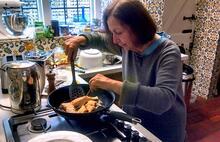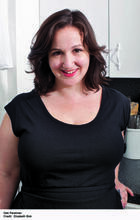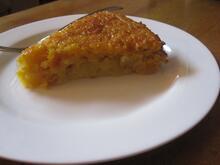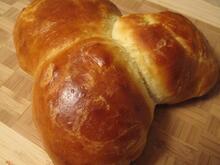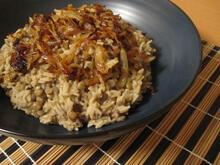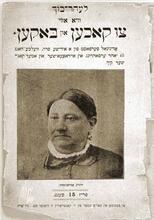Claudia Roden
Born to a Syrian-Jewish family in Cairo, Claudia Roden studied in London to become a painter before becoming engrossed by the stories and recipes of Britain’s expatriate Egyptian community. She began researching the first of dozens of award-winning books, interviewing relatives and collecting stories and recipes at Friday night dinners at her parents’ home in London. She began teaching Middle Eastern cooking from her home, hosting the BBC series Claudia Roden’s Mediterranean Cookery and becoming a prolific food journalist. Her cookbooks introduced new cooking styles and flavors to those unfamiliar with the food and culture of the Middle East and North Africa. Realizing the importance of giving context to the recipes, she included food and cultural history, geography, genealogy, poetry, jokes, and holiday rituals in her books.
Claudia Roden single-handedly opened up the world of Descendants of the Jews who lived in Spain and Portugal before the explusion of 1492; primarily Jews of N. Africa, Italy, the Middle East and the Balkans.Sephardic and Lit. "Eastern." Jew from Arab or Muslim country.Mizrahi Jewish foods to chefs, food critics, and home cooks across the globe, providing a new portal into understanding and experiencing Jewish food and culture.
Roden is the ultimate resource on the subject of Jewish food and Middle Eastern cooking. She is best known for two publications: A Book of Middle Eastern Food, a cookbook first published in 1968 that remains an important influence on top chefs around the world, and The Book of Jewish Food: An Odyssey from Samarkand to New York, a kind of bible of Jewish cooking that provides a detailed history of Jewish holidays and recipes from the diaspora.
Family and Education
Claudia Roden was born in 1936 in Cairo, Egypt. Her father, Cesar Elie Douek, and her mother, Nelly Sassoon, brought together two large and prosperous close-knit Syrian Jewish merchant families. Three of Roden’s grandparents came from Aleppo, the fourth, her maternal grandmother, came from Istanbul. Roden’s paternal great-grandfather was the chief rabbi of Aleppo and sired 26 children.
With the opening of the Suez Canal in 1859, the cotton trade opened opportunities for merchant life at the same time the silk trade was waning in Aleppo. In the 1890s Roden’s ancestors moved their operations to Cairo, where they became part of a vibrant Jewish community. Roden grew up with two brothers, Ellis Douek, a physician, and Zaki Douek, and she has hundreds of cousins scattered all over Europe and the Americas. Her childhood was spent in Egypt, at the time a very cosmopolitan world, heavily influenced by European culture. It was common in the homes of the well-educated to speak French in addition to their native language.
In 1951, at age fifteen, Roden followed her brothers to Paris, where they were studying, and attended boarding school for three years. In 1954 the three moved to London, Claudia to study painting at St. Martin’s School of Art in the style of Diego Rivera, Ellis to attend medical school, and Zaki to attend the French Lycée.
The siblings shared a flat and Claudia experimented with cooking, preparing meals for her brothers and fellow students. Although she had not learned how to cook in her native Egypt, she remembered meals of pies stuffed with eggplant and spinach, family recipes from Alphandary, her maternal grandmother, and the mint and lamb of Sarah Hara, her paternal grandmother. These were not foods served in London at the time, and hunting for these ingredients became an adventure.
In 1959, Claudia married Paul Roden, a manufacturer and importer of children’s clothing. They had three children: Simon (1960), Nadia (1961) and Anna (1965). They separated in 1974 and divorced in 1979.
Memories of Egyptian Culture
On October 29, 1956, Britain and France joined with Israel to attack Egypt in order to reverse President Gamal Abdel Nasser’s nationalization of the Suez Canal. After the Suez War, which lasted seven days, Nasser seized the canal and began expelling Jews and foreigners as his revenge. It is estimated that almost 25,000 Jews left Egypt between November 1956 and the end of 1958. Jews were expelled in two waves; the first were given 24 hours to leave, while the second group was ordered to leave in two to seven days. Those expelled had their exit visas stamped “One Way-No Return” and Egyptian Jews were stripped of their citizenship as they left the country. At this time Roden’s parents relocated to London. With Egyptian Jewish refugees inundating London on their way to Israel, other European locations, and the Americas, the Roden family hosted countless dinners for extended family and friends who were passing through the area in search of a new home and a new beginning.
Not long after Roden’s parents moved to London, her mother, who had not cooked at home in Cairo but taught their cook the special family dishes, became a passionate cook and entertained and hosted family and friends at their home. Claudia would come for Friday night dinners and she used the opportunity to collect stories, jokes, and long-held family recipes of their guests. These families had left behind all their worldly possessions, not knowing what the future would bring. Would they be reconnected with family members again? How would they support their families? And what of the rich culture and traditions that were so important to their daily life? Would they be lost forever? With this great loss, there was a strong need among those expelled to find a way to stay connected to their past and to each other. Sharing family recipes was a way to keep the memories alive. Until this time, no Egyptian cookbooks existed and recipes were closely held secrets passed down in families through the daughters, never written down, only taught. But now sharing recipes became a vital connection to family memories and to the culture they were leaving behind. Understanding what was at stake, Roden began talking with as many people as possible, recording recipes and family stories from the Middle East and North Africa. This new passion became the project that led to Roden’s study of Mediterranean cuisine and the writing of cookbooks.
Professional Life
As a single parent, Roden had a number of jobs while being consumed by this new passion of collecting recipes and family stories. As she became more involved with the collection of recipes, she expanded her interest in food to teaching Middle Eastern cooking from her home, hosting the BBC television series Claudia Roden’s Mediterranean Cookery (at the time thought to be the healthiest diet to follow) as well as becoming a prolific food journalist. Her earliest cookbook introduced new cooking styles and flavors to those previously unfamiliar with the food and culture of the Middle East and North Africa. She introduced vegetables and spice combinations, sometimes mixing sweet with sour. Her recipes used tomatoes, peppers, eggplant, fish, chickpeas, almond flour, olives, olive oil, garlic, artichokes, broad beans, rice, bulgar, and lentils, and many spices new to Western palates, including cumin, cinnamon, saffron, and harissa.
Roden’s writing has appeared in many publications, including The Daily Telegraph, The Sunday Times Magazine, Bon Appetit, Gourmet, Food and Wine, and many others.
Roden’s obsession with researching and collecting recipes had a two-fold motivation: she felt a serious responsibility to preserve these foods, as her generation was heavily influenced by European culture and she knew the danger of losing her history and culture was real. At the same time, she wrote to challenge the misconceptions about life and culture in the Middle East that existed at the time. Roden knew that sharing her rich cultural heritage through food could be a way to do this.
As Roden expanded her research and collection of recipes, she also realized the importance of giving context to the recipes she was collecting, and so she included food and cultural history, geography, genealogy, poetry, jokes, and holiday rituals in her books. Her first cookbook, A Book of Middle Eastern Food, became the first book with recipes from the Mediterranean and revolutionized Western attitudes toward the cuisines of the Middle East and North Africa.
Roden has amassed numerous awards for her work as a cookbook writer and food writer. When asked about her most treasured award, she points to the lifetime achievement award given to her at the 16th Jerusalem Jewish Film Festival in December 2014, at which she was recognized “for her contribution to culinary culture."
Food writer and cookbook author Claudia Roden with Yasmin Kahn, “Exploring Middle Eastern Food and Identity,” Oxford Cultural Collective, October 7, 2019.
Roden is the President of the The Oxford Symposium on Food and Cookery (OFS), an annual weekend conference of academics, food writers, cooks, and those with an interest in food and culture to meet and discuss current issues in food studies and food history. She is also an Honorary Fellow at University College London( UCL) and the School of Oriental and African Studies (SOAS), where she is a frequent presenter on their lecture series.
Food writer and cookbook author Claudia Roden, SOAS Centenary Lecture, University of London, February 15, 2017.
Passion for food is part of Roden’s life’s work. She continues to search for the best possible dish. She says she is freer now in her cooking style. She often meets with chefs who mention how important her recipes have been in developing their own cooking style. Ever the student, Roden says she continues to be influenced by their innovations.
Food writer and cookbook author Claudia Roden. TEDxHackney, November 6, 2015.
Roden lives outside London and continues to travel, research, teach, write, cook and lecture. This passion for unearthing stories and linking food to culture is reflected in her numerous publications. Her latest work, Claudia Roden’s Mediterranean: Treasured Recipes from a Lifetime of Travel, was published in the fall of 2021.
Awards
Premio Orio Vergani (1989)
Premio Maria Luigia, Duchessa di Parma (1989)
National Jewish Book Award (1997)
James Beard Best Cookbook of the Year (1997)
Andre Simon Award (1997)
Versailles Award (1999)
The Prince Claus Award of the Netherlands (1999)
Andre Simon Award (2005)
IACP award for Food of Spain (2012)
The Johannes van Dam Award Netherlands (2013)
The Fortnum and Mason Jury’s Award for her work in General (2015)
Observer Lifetime Achievement Award (2019)
Six Glenfiddich Food and Drink prizes
Numerous Gourmand World Cookbook Awards
Selected Works by Claudia Roden
A Book of Middle Eastern Food. London: Nelson, 1968.
A New Book of Middle Eastern Food. Harmondsworth: Penguin, 1970.
Coffee. Harmondsworth: Penguin, 1981.
Mediterranean Cookery. London: BBC Books, 1987.
The Food of Italy. London: Arrow Books, 1990.
1992: Claudia Roden’s Invitation to Mediterranean Cooking: 150 Vegetarian and Seafood Recipe
The Book of Jewish Food: An Odyssey from Samarkand and Vilna to the Present Day. New York: Knopf, 1996.
Tamarind and Saffron: Favourite Recipes from the Middle East. London: Viking, 1999.
Picnics: And Other Outdoor Feasts. London: Grub Street, 2001.
Claudia Roden‘s Foolproof Mediterranean Cooking. London: BBC, 2003.
Arabesque - Sumptuous Food from Morocco, Turkey and Lebanon. London: Michael Joseph, 2005.
Simple Mediterranean Cookery. London: BBC Books, 2006.
The Food of Spain. New York: Ecco Press, 2011.
"Claudia Roden and the Power of Food." Flow Magazine. https://www.flowmagazine.com/flow-magazine/claudia-roden-and-the-power-of-food.html
Julius, Lyn 2017. "The Suez Crisis and the Jews of Egypt." Fathom Journal (Autumn 2017). https://fathomjournal.org/the-suez-crisis-and-the-jews-of-egypt,
Kahn, Yasmin, as told to Molly Tait Hyland. "How Claudia Roden made Middle Eastern Food Commonplace." The Guardian, September 21, 2018. theguardian.com/food/2018/sep/21/yasmin-khan-claudia-roden-chef-middle-easter-food-recipes
Kramer, Jane. "Spice Routes, Claudia Roden's Culinary Diaspora. Letters from Europe, August 27, 2007.” New Yorker, September 3, 2007. https://www.newyorker.com/magazine/2007/09/03/spice-routes
Nathan, Joan. "Claudia Roden." Jewish Women: A Comprehensive Historical Encyclopedia. 20 March 2009. Jewish Women's Archive. (Viewed on April 29, 2021) <https://jwa.org/encyclopedia/article/roden-claudia>.
Roden, Claudia. Video interview with the author, March 17, 2021.
Roden Claudia. Email communication with the author, March 2021.

